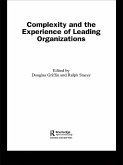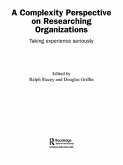Ralph Stacey
Complex Responsive Processes in Organizations (eBook, ePUB)
Learning and Knowledge Creation
52,95 €
52,95 €
inkl. MwSt.
Sofort per Download lieferbar

26 °P sammeln
52,95 €
Als Download kaufen

52,95 €
inkl. MwSt.
Sofort per Download lieferbar

26 °P sammeln
Jetzt verschenken
Alle Infos zum eBook verschenken
52,95 €
inkl. MwSt.
Sofort per Download lieferbar
Alle Infos zum eBook verschenken

26 °P sammeln
Ralph Stacey
Complex Responsive Processes in Organizations (eBook, ePUB)
Learning and Knowledge Creation
- Format: ePub
- Merkliste
- Auf die Merkliste
- Bewerten Bewerten
- Teilen
- Produkt teilen
- Produkterinnerung
- Produkterinnerung

Bitte loggen Sie sich zunächst in Ihr Kundenkonto ein oder registrieren Sie sich bei
bücher.de, um das eBook-Abo tolino select nutzen zu können.
Hier können Sie sich einloggen
Hier können Sie sich einloggen
Sie sind bereits eingeloggt. Klicken Sie auf 2. tolino select Abo, um fortzufahren.

Bitte loggen Sie sich zunächst in Ihr Kundenkonto ein oder registrieren Sie sich bei bücher.de, um das eBook-Abo tolino select nutzen zu können.
This work demonstrates how the 'knowledge economy' can be seen in a new light when considered from a complexity perspective. It stresses the imporance of relationships as a source of - and influence on - information and knowledge creation.
- Geräte: eReader
- mit Kopierschutz
- eBook Hilfe
- Größe: 4.05MB
Andere Kunden interessierten sich auch für
![Experiencing Spontaneity, Risk & Improvisation in Organizational Life (eBook, ePUB) Experiencing Spontaneity, Risk & Improvisation in Organizational Life (eBook, ePUB)]() Experiencing Spontaneity, Risk & Improvisation in Organizational Life (eBook, ePUB)52,95 €
Experiencing Spontaneity, Risk & Improvisation in Organizational Life (eBook, ePUB)52,95 €![Changing Conversations in Organizations (eBook, ePUB) Changing Conversations in Organizations (eBook, ePUB)]() Patricia ShawChanging Conversations in Organizations (eBook, ePUB)57,95 €
Patricia ShawChanging Conversations in Organizations (eBook, ePUB)57,95 €![Complexity and Innovation in Organizations (eBook, ePUB) Complexity and Innovation in Organizations (eBook, ePUB)]() Jose FonsecaComplexity and Innovation in Organizations (eBook, ePUB)74,95 €
Jose FonsecaComplexity and Innovation in Organizations (eBook, ePUB)74,95 €![Complexity and the Experience of Leading Organizations (eBook, ePUB) Complexity and the Experience of Leading Organizations (eBook, ePUB)]() Complexity and the Experience of Leading Organizations (eBook, ePUB)48,95 €
Complexity and the Experience of Leading Organizations (eBook, ePUB)48,95 €![Complexity and the Experience of Values, Conflict and Compromise in Organizations (eBook, ePUB) Complexity and the Experience of Values, Conflict and Compromise in Organizations (eBook, ePUB)]() Complexity and the Experience of Values, Conflict and Compromise in Organizations (eBook, ePUB)46,95 €
Complexity and the Experience of Values, Conflict and Compromise in Organizations (eBook, ePUB)46,95 €![A Complexity Perspective on Researching Organisations (eBook, ePUB) A Complexity Perspective on Researching Organisations (eBook, ePUB)]() A Complexity Perspective on Researching Organisations (eBook, ePUB)51,95 €
A Complexity Perspective on Researching Organisations (eBook, ePUB)51,95 €![Advancing Organizational Theory in a Complex World (eBook, ePUB) Advancing Organizational Theory in a Complex World (eBook, ePUB)]() Advancing Organizational Theory in a Complex World (eBook, ePUB)46,95 €
Advancing Organizational Theory in a Complex World (eBook, ePUB)46,95 €-
-
-
This work demonstrates how the 'knowledge economy' can be seen in a new light when considered from a complexity perspective. It stresses the imporance of relationships as a source of - and influence on - information and knowledge creation.
Dieser Download kann aus rechtlichen Gründen nur mit Rechnungsadresse in A, B, BG, CY, CZ, D, DK, EW, E, FIN, F, GR, HR, H, IRL, I, LT, L, LR, M, NL, PL, P, R, S, SLO, SK ausgeliefert werden.
Produktdetails
- Produktdetails
- Verlag: Taylor & Francis eBooks
- Seitenzahl: 272
- Erscheinungstermin: 2. September 2003
- Englisch
- ISBN-13: 9781134535187
- Artikelnr.: 47885926
- Verlag: Taylor & Francis eBooks
- Seitenzahl: 272
- Erscheinungstermin: 2. September 2003
- Englisch
- ISBN-13: 9781134535187
- Artikelnr.: 47885926
- Herstellerkennzeichnung Die Herstellerinformationen sind derzeit nicht verfügbar.
Ralph Stacey is Professor of Management and Director of the Complexity and Management Centre at the University of Hertfordshire, and a member of the Institute of Group Analysis. He is also consultant to managers at many levels accross a range of organizations and the author of a number of books and articles on strategy and complexity theory in management.
List of illustrations, Series preface, Acknowledgements, 1. Introduction:
can learning and knowledge creation in organizations really be managed?,
Part I. The foundations of mainstream views on learning and knowledge
creation in organizations: systems thinking, 2. Mainstream thinking about
learning and knowledge creation in organizations, 3. Different levels of
learning and knowledge creation in organizations: the individual and the
social, Part II. Toward a complexity perspective: the emergence of
knowledge in complex responsive processes of relating, 4. The emergence of
the individual and the social in communicative interaction, 5.
Communicative action in the medium of symbols, 6. The organization of
communicative action: rule-based or self-organizing knowledge?, 7. The
emergence of enabling constraints: power relations and unconscious
processes, 8. Organization as communicating in the living present: how
knowledge emerges in complex responsive processes of relating, Part III.
Systems thinking and the perspective of complex responsive processes:
comparisons and implications, 9. Comparing systems thinking and the
perspective of complex responsive processes, 10. The organizational
implications of complex responsive processes of knowledge creation,
Appendix: Autopoiesis: an inappropriate analogy for human action,
Bibliography, Index
can learning and knowledge creation in organizations really be managed?,
Part I. The foundations of mainstream views on learning and knowledge
creation in organizations: systems thinking, 2. Mainstream thinking about
learning and knowledge creation in organizations, 3. Different levels of
learning and knowledge creation in organizations: the individual and the
social, Part II. Toward a complexity perspective: the emergence of
knowledge in complex responsive processes of relating, 4. The emergence of
the individual and the social in communicative interaction, 5.
Communicative action in the medium of symbols, 6. The organization of
communicative action: rule-based or self-organizing knowledge?, 7. The
emergence of enabling constraints: power relations and unconscious
processes, 8. Organization as communicating in the living present: how
knowledge emerges in complex responsive processes of relating, Part III.
Systems thinking and the perspective of complex responsive processes:
comparisons and implications, 9. Comparing systems thinking and the
perspective of complex responsive processes, 10. The organizational
implications of complex responsive processes of knowledge creation,
Appendix: Autopoiesis: an inappropriate analogy for human action,
Bibliography, Index
List of illustrations, Series preface, Acknowledgements, 1. Introduction:
can learning and knowledge creation in organizations really be managed?,
Part I. The foundations of mainstream views on learning and knowledge
creation in organizations: systems thinking, 2. Mainstream thinking about
learning and knowledge creation in organizations, 3. Different levels of
learning and knowledge creation in organizations: the individual and the
social, Part II. Toward a complexity perspective: the emergence of
knowledge in complex responsive processes of relating, 4. The emergence of
the individual and the social in communicative interaction, 5.
Communicative action in the medium of symbols, 6. The organization of
communicative action: rule-based or self-organizing knowledge?, 7. The
emergence of enabling constraints: power relations and unconscious
processes, 8. Organization as communicating in the living present: how
knowledge emerges in complex responsive processes of relating, Part III.
Systems thinking and the perspective of complex responsive processes:
comparisons and implications, 9. Comparing systems thinking and the
perspective of complex responsive processes, 10. The organizational
implications of complex responsive processes of knowledge creation,
Appendix: Autopoiesis: an inappropriate analogy for human action,
Bibliography, Index
can learning and knowledge creation in organizations really be managed?,
Part I. The foundations of mainstream views on learning and knowledge
creation in organizations: systems thinking, 2. Mainstream thinking about
learning and knowledge creation in organizations, 3. Different levels of
learning and knowledge creation in organizations: the individual and the
social, Part II. Toward a complexity perspective: the emergence of
knowledge in complex responsive processes of relating, 4. The emergence of
the individual and the social in communicative interaction, 5.
Communicative action in the medium of symbols, 6. The organization of
communicative action: rule-based or self-organizing knowledge?, 7. The
emergence of enabling constraints: power relations and unconscious
processes, 8. Organization as communicating in the living present: how
knowledge emerges in complex responsive processes of relating, Part III.
Systems thinking and the perspective of complex responsive processes:
comparisons and implications, 9. Comparing systems thinking and the
perspective of complex responsive processes, 10. The organizational
implications of complex responsive processes of knowledge creation,
Appendix: Autopoiesis: an inappropriate analogy for human action,
Bibliography, Index







